
Alcohol, a widely consumed beverage, has both short-term and long-term effects on your health. From impairing judgment and coordination to increasing the risk of developing chronic diseases, alcohol can have a significant impact on various aspects of your wellbeing. In this article, we will explore the ways in which alcohol can affect your physical and mental health, providing you with valuable insights to make more informed choices about your drinking habits.
Physical effects of alcohol
Immediate effects
When you consume alcohol, it quickly enters your bloodstream and starts to affect your body. The immediate effects of alcohol can be seen within minutes of consumption. You may experience a warm sensation as your blood vessels dilate, causing a flushed face. Alcohol also inhibits the production of vasopressin, a hormone that regulates fluid balance, leading to increased urination. This can result in dehydration.
Long-term effects
Long-term alcohol consumption can take a toll on your overall health. One of the most commonly affected organs is the liver.
Liver damage
The liver plays a crucial role in filtering toxins from the body, but excessive alcohol consumption can lead to liver damage. When you drink alcohol, your liver breaks it down into acetaldehyde, a toxic substance that can cause inflammation and scarring of liver tissue. Over time, this can lead to serious conditions such as alcoholic hepatitis, cirrhosis, or even liver failure.
Cardiovascular issues
Alcohol can have both positive and negative effects on the cardiovascular system, depending on the quantity consumed. Moderate alcohol consumption may have some protective effects on the heart, but excessive drinking can increase the risk of cardiovascular issues. Chronic heavy drinking can lead to high blood pressure, irregular heart rhythms, and an increased risk of heart disease and stroke.
Digestive system problems
Alcohol can irritate the lining of the digestive system, leading to various issues. It can cause inflammation and damage to the esophagus, resulting in conditions like esophageal varices. Gastritis and gastric ulcers are also common among heavy drinkers, as alcohol increases stomach acid secretion and weakens the protective lining of the stomach. In severe cases, alcohol abuse can even lead to pancreatitis, a painful condition characterized by inflammation of the pancreas.
Mental and emotional effects of alcohol
Depression and anxiety
While some people may initially turn to alcohol for its sedative effects, it can actually worsen mental health conditions in the long run. Alcohol is a depressant, and excessive or chronic use can contribute to the development of depression and anxiety. This is due to the impact of alcohol on neurotransmitters in the brain, such as serotonin and dopamine, which are essential for regulating mood.
Impaired cognitive function
Alcohol has a significant effect on cognitive function and can impair your ability to think clearly, make decisions, and remember things. Even drinking small amounts can affect your concentration and reaction time. Heavy alcohol use over time can lead to permanent damage to the brain, resulting in cognitive deficits and memory loss.
Increased risk of mental health disorders
Drinking alcohol excessively can greatly increase your risk of developing mental health disorders such as alcohol use disorder (AUD), which is commonly known as alcoholism. Additionally, it can also contribute to the development of other mental health conditions like bipolar disorder and schizophrenia. Alcohol acts as a central nervous system depressant, and the long-term effects can disrupt the delicate balance of brain chemistry.
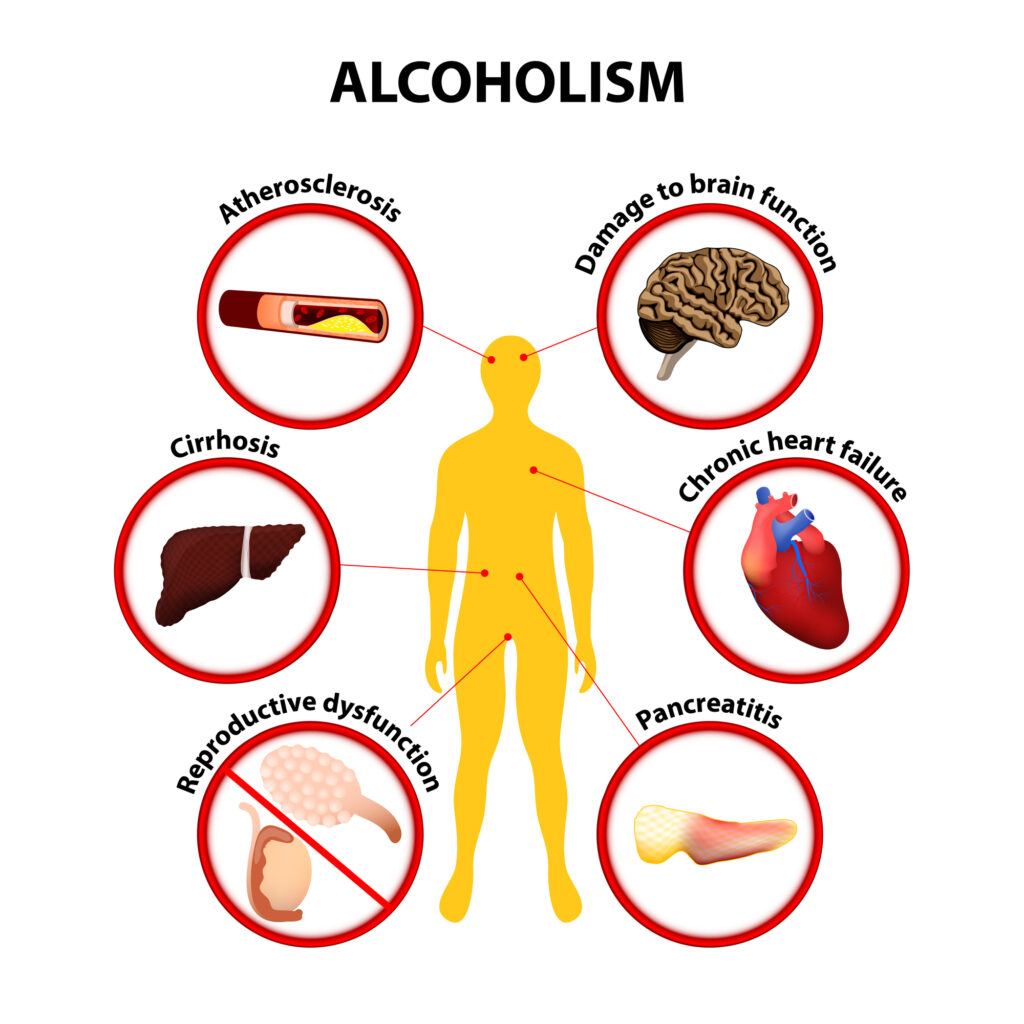
This image is property of www.racnj.com.
Alcohol and weight gain
Empty calories
Alcoholic beverages are often high in calories, which can contribute to weight gain. Unlike other nutrients, alcohol itself does not provide any essential vitamins or minerals. Instead, it contains empty calories that can quickly add up. For example, a standard glass of wine or a bottle of beer can contain around 120-150 calories, and cocktails can be even higher.
Effect on metabolism
When you consume alcohol, your body prioritizes metabolizing it above other macronutrients like carbohydrates and fats. This can slow down your metabolism and make it harder for your body to burn calories efficiently. Additionally, alcohol can interfere with the production and use of glucose, affecting blood sugar levels and potentially leading to weight gain.
Increased appetite
Alcohol has been shown to increase appetite, making it harder to resist unhealthy food cravings. This can lead to overeating and a higher intake of calories. Moreover, alcohol can reduce inhibitions, impairing your judgment when it comes to making healthy food choices.
Disruption of nutrient absorption
Excessive alcohol consumption can interfere with the absorption and metabolism of essential nutrients, such as vitamins and minerals. Alcohol can damage the lining of the stomach and intestines, reducing their ability to absorb nutrients properly. This can lead to deficiencies in vital nutrients like vitamin B12, folate, and magnesium, which are important for overall health and maintaining a healthy weight.
Alcohol and addiction
Risk of developing alcoholism
Alcohol is a highly addictive substance, and regular or heavy drinking increases the risk of developing alcoholism. Alcohol use disorder (AUD) is a chronic condition characterized by the inability to control or stop drinking, despite negative consequences. Factors such as genetics, environmental influences, and mental health play a role in determining an individual’s susceptibility to alcohol addiction.
Withdrawal symptoms
When your body becomes dependent on alcohol, you may experience withdrawal symptoms when you try to reduce or stop drinking. Symptoms can range from mild to severe and may include tremors, sweating, nausea, anxiety, and even seizures. It is important to seek medical assistance when attempting to quit drinking to ensure your safety and receive appropriate support.
Physical and psychological dependence
Alcohol can create both physical and psychological dependence. Physical dependence occurs when your body adapts to the presence of alcohol and requires it to function normally. Psychological dependence, on the other hand, involves a strong craving or compulsion to drink alcohol due to the rewarding effects it has on the brain. Combating alcohol addiction often requires a comprehensive approach that involves medical, behavioral, and social support.
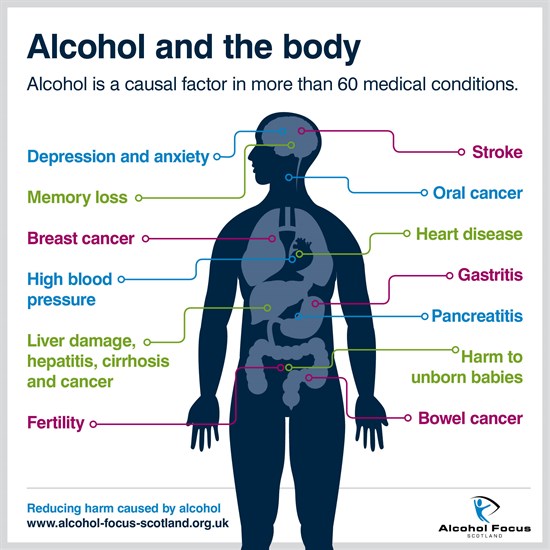
This image is property of www.alcohol-focus-scotland.org.uk.
Alcohol and sleep
Impact on sleep quality
While alcohol may initially make you feel drowsy and help you fall asleep, it can significantly disrupt the quality of your sleep. Alcohol affects the natural sleep cycle, reducing the amount of time spent in Rapid Eye Movement (REM) sleep, which is crucial for deep restorative sleep. As a result, you may wake up feeling groggy and tired, despite having spent enough time in bed.
Sleep disorders and alcohol
Alcohol consumption is closely linked to sleep disorders such as insomnia and sleep apnea. Insomnia can occur both during alcohol consumption and when trying to quit or reduce drinking. Sleep apnea, a condition characterized by pauses in breathing during sleep, is more common among heavy drinkers. These sleep disorders can further exacerbate the negative impact on overall sleep quality, leading to fatigue, impaired cognitive function, and increased risk of accidents.
Alcohol-induced insomnia
Alcohol-induced insomnia refers to difficulty falling asleep or staying asleep as a direct result of alcohol consumption. While alcohol may initially make you feel sleepy, it disrupts the natural sleep cycle, preventing you from achieving deep and restful sleep. This can lead to a vicious cycle where you rely on alcohol to fall asleep but end up experiencing poor sleep quality, further reinforcing the need for alcohol to induce sleep.
Alcohol and the immune system
Weakened immune response
Excessive alcohol consumption can weaken the immune system, making you more susceptible to infections and illnesses. Alcohol alters the production and function of immune cells, reducing your body’s ability to defend against pathogens. This can lead to more frequent infections, prolonged illness, and an overall weakened immune response.
Increased susceptibility to infections
Alcohol impacts different aspects of the immune system, including white blood cell function and the production of antibodies. As a result, heavy drinkers are more prone to infections such as pneumonia, respiratory infections, and urinary tract infections. Chronic alcohol use can also impair the effectiveness of vaccines, making them less protective.
Impaired wound healing
Alcohol interferes with the body’s natural healing processes. It can impair the formation of new blood vessels necessary for wound healing and hinder the production of new skin cells. This can lead to delayed wound healing, increased risk of complications, and potentially more severe scarring.
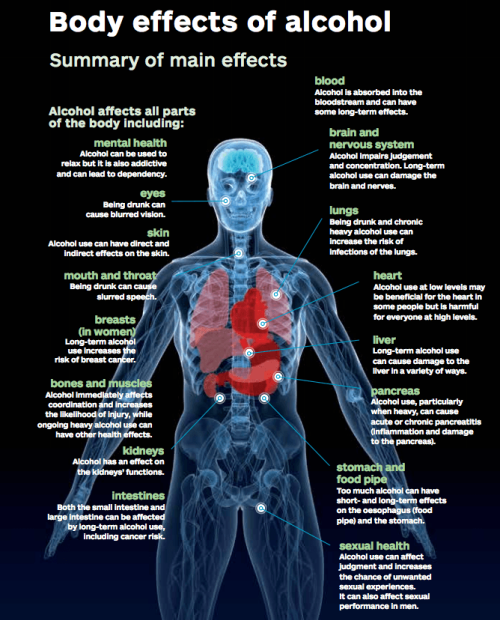
This image is property of www.thelmamcmillenrecoverycenter.com.
Alcohol and the reproductive system
Reduced fertility
Alcohol can have detrimental effects on fertility in both men and women. In men, heavy alcohol consumption can lead to decreased sperm production, reduced sperm motility, and abnormal sperm shape. In women, chronic alcohol use can disrupt hormone levels and menstrual cycles, affecting ovulation and fertility. Cutting back on alcohol or abstaining completely may improve fertility outcomes.
Increased risk of complications during pregnancy
Drinking alcohol during pregnancy can have serious implications for the health of the fetus. It increases the risk of complications such as miscarriage, premature birth, low birth weight, and stillbirth. Fetal alcohol spectrum disorders (FASDs) can also occur, leading to physical, behavioral, and cognitive developmental issues in the child.
Birth defects
Prenatal alcohol exposure can cause a range of birth defects collectively known as fetal alcohol syndrome (FAS). These defects can affect the physical, cognitive, and behavioral development of the child. It is important for pregnant women and those planning to conceive to completely avoid alcohol to ensure the best possible outcomes for their child.
Alcohol and the nervous system
Brain damage and cognitive impairment
Prolonged and excessive alcohol consumption can cause significant damage to the brain, resulting in cognitive impairment and other neurological effects. Alcohol-related brain damage can lead to memory loss, difficulties with problem-solving and decision-making, and difficulties in coordination and balance. In severe cases, it can even lead to a condition known as Wernicke-Korsakoff syndrome, characterized by severe memory loss and cognitive deficits.
Peripheral neuropathy
Alcohol abuse can also lead to peripheral neuropathy, a condition characterized by damage to the nerves outside the brain and spinal cord. Symptoms include numbness, tingling, weakness, and pain in the extremities. Peripheral neuropathy can significantly impact a person’s quality of life and limit their ability to perform daily tasks.
Increased risk of neurological disorders
Heavy, long-term alcohol use is associated with an increased risk of developing neurological disorders such as dementia and neuropathies. Alcohol-related dementia can cause memory loss, confusion, and difficulty with problem-solving. Additionally, alcohol can also increase the risk of developing neurological conditions like Parkinson’s disease and multiple sclerosis.
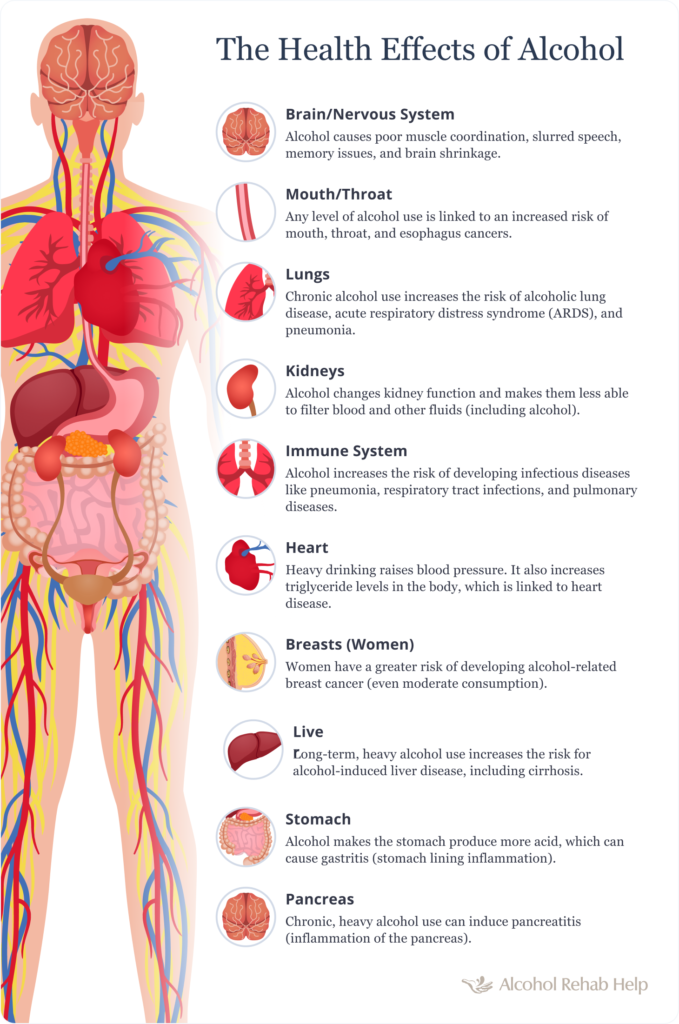
This image is property of alcoholrehabhelp.org.
Alcohol and the cardiovascular system
High blood pressure
Regular or excessive alcohol consumption can raise blood pressure levels. High blood pressure, also known as hypertension, is a significant risk factor for heart disease and stroke. Alcohol can directly affect blood pressure levels and can also contribute to weight gain, another risk factor for hypertension. Moderation is key when it comes to alcohol consumption to minimize the impact on blood pressure.
Irregular heart rhythm
Alcohol can disrupt the electrical signals in the heart, leading to an irregular heart rhythm or arrhythmia. This can manifest as a faster or slower heartbeat, palpitations, or skipped beats. In severe cases, alcohol-induced arrhythmias can be life-threatening and require medical intervention.
Increased risk of heart disease and stroke
While moderate alcohol consumption has been associated with a lower risk of heart disease, excessive drinking can have the opposite effect. Chronic heavy alcohol use can contribute to the build-up of fatty plaques in the arteries, narrowing them and obstructing blood flow. This can increase the risk of heart disease, heart attacks, and strokes, ultimately leading to serious and potentially fatal consequences.
Alcohol and the digestive system
Esophageal varices
Excessive alcohol consumption can lead to the development of esophageal varices. These are enlarged veins in the esophagus that result from liver damage and increased pressure in the blood vessels. Esophageal varices can be life-threatening, as they are prone to bleeding and may require emergency medical attention.
Gastritis and gastric ulcers
Alcohol abuse can cause inflammation of the stomach lining, known as gastritis. Symptoms may include stomach pain, nausea, and vomiting. In severe cases, chronic alcohol use can also lead to gastric ulcers, open sores in the lining of the stomach or small intestine. Gastritis and gastric ulcers can cause significant discomfort and increase the risk of complications such as bleeding or perforation.
Pancreatitis
Alcohol-induced pancreatitis is a serious condition characterized by inflammation of the pancreas. The pancreas plays a crucial role in digestion and insulin production, and alcohol can disrupt its normal functioning. Symptoms of pancreatitis include severe abdominal pain, nausea, and vomiting. This condition requires immediate medical attention, as it can lead to life-threatening complications.
In conclusion, alcohol can have numerous physical effects on the body, both immediate and long-term. It can negatively impact the liver, cardiovascular system, digestive system, immune system, reproductive system, nervous system, and sleep patterns. Additionally, alcohol can also lead to addiction and mental health disorders. It is essential to consume alcohol in moderation and be aware of the potential risks associated with excessive or chronic alcohol use. Seeking professional help and support is crucial for those struggling with alcohol addiction or its effects on their health. Remember, your well-being is a priority, and making informed choices regarding alcohol consumption can lead to a healthier and happier life.
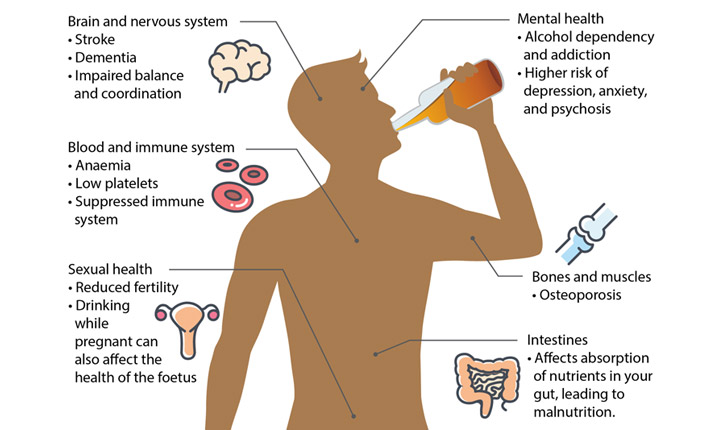
This image is property of sereneretreat.my.